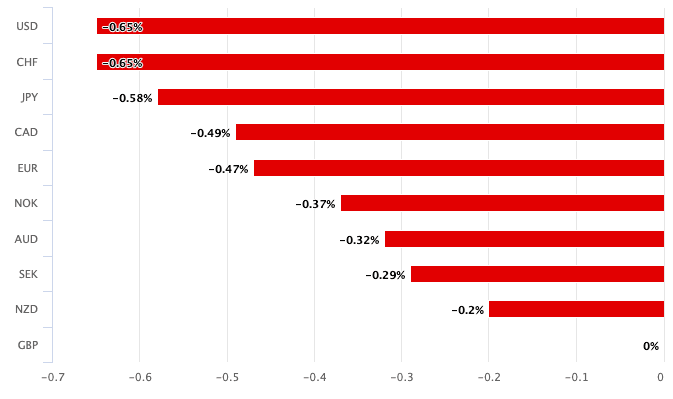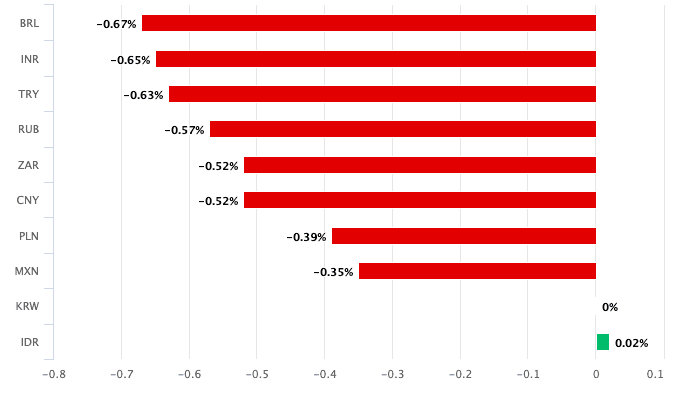Pound Hammered by "Activist" Bailey
- Written by: Gary Howes

Image © Pound Sterling Live, Still Courtesy of Bloomberg TV.
Pound Sterling fell by over a per cent on Thursday after markets sensed the Bank of England could be about to cut interest rates by 50 basis points.
In an interview released Thursday, Bank of England Governor Andrew Bailey said it could be time to accelerate the pace of interest rate cuts at the Bank of England, marking a sudden departure from a previously cautious approach to easing monetary policy.
Speaking with the Guardian newspaper, Bailey said the Bank can be a "bit more aggressive" in cutting interest rates if the news on inflation continues to be good, and later that it could be "a bit more activist" in that situation.
Compare Currency Exchange Rates
Find out how much you could save on your international transfer
Estimated saving compared to high street banks:
£2,500.00
Free • No obligation • Takes 2 minutes
The widespread selloff in Pound exchange rates shows the markets think this is a pivotal moment for the Bank as a shift in stance on interest rate policy has happened.
The Pound to Euro exchange rate has slipped back to 1.1953 (-0.50%) amidst the broad-based selloff in Sterling and the Pound to Dollar exchange rate is 0.60% lower on the day at 1.3189. Those sending money will now be seeing rates down to around 1.19 (compare euro rates) and 1.3140, respectively (compare dollar rates).
A look at the performance board shows the Pound is down against all G10 currencies, indicating a selloff targeted specifically at the UK currency:

In fact, the underperformance is not restricted to just the G10 basket of the world's biggest currencies but extends to Emerging Market and Eastern European names too:

"This has been a bruising week for the pound," says Kathleen Brooks, research director at XTB. "Bailey’s comments have undermined the pound’s yield differential with the US and Europe. The market has fully priced in a rate cut from the BOE next month, and there is a 61% chance of another cut in December, up from 47%."
Money market pricing shows that investors now see more than 25 basis points of cuts priced for November's meeting, meaning a jumbo 50bp move is now in play.
So why has Bailey changed his tone from being one of the more cautious central bankers to an "activist" one?
We think the herd has changed his thinking.
Bailey's latest comments follow a sharp fall in Eurozone inflation that prompted European Central Bank (ECB) President Christine Lagarde to indicate that an October rate cut was now possible.
This would mean the ECB will deliver consecutive rate cuts and is stepping up the pace of easing. This, in turn, follows the sizeable 50bp cut at the Federal Reserve last month.
🎯 GBP/EUR year-ahead forecast: Consensus targets from our survey of over 30 investment bank projections. 📩 Request your copy.
Next week, the RBNZ is tipped to accelerate the pace of cuts by going 50bp, as will the Bank of Canada later this month.
Bailey's pivot in messaging suggests he doesn't want the UK to be left behind.
But the Governor risks putting the Bank's credibility on the line with such a pivot as it was a mere few weeks ago that he said caution on interest rates was still warranted.
On September 24 Bailey said "I do think the path for interest rates will be downwards, gradually." Contrast this with today's message that there was a chance of the Bank becoming more “a bit more activist” in its approach to cutting interest rates.
The Banks own forecasts show UK inflation will continue rising in the coming months and end the year higher than at current levels.
The question for markets is whether the Bank now watches other central banks for guidance or whether it targets another economic metric apart from inflation.
For sure, a central bank that can be "a bit more activist" - as Bailey says - must be looking at other metrics beyond inflation.
The development sets the Pound up for a volatile month, and some analysts think a period of outperformance has come to an end.
"We suspect that it will weaken more over the next year or so given our dovish view of Bank of England policy, the currency’s still-high valuation, and stretched speculative positioning," says Hubert de Barochez, Senior Markets Economist at Capital Economics.




